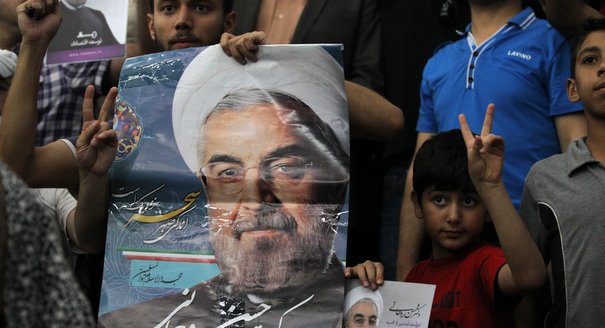Much of the Western world treats Iran as a pariah state. But countries surrounding Iran cannot afford to take an aggressive stance toward a big and powerful neighbor with whom they have so much everyday business.
So the replacement of Mahmoud Ahmadinejad with Hassan Rowhani as president of Iran will have brought audible sighs of relief to the three countries of the South Caucasus.
Armenia, Azerbaijan, and Georgia are Iran’s three European neighbors, both in terms of literal geography and culture (and even if there is not much European about Nakhichevan or Kapan).
In recent years, there has been a lot of traffic of Iranians, mainly of the middle-class variety, to the Caucasus countries. In 2010, Georgia joined Armenia and Turkey in lifting visa restrictions for Iranians (thereby also giving Georgia the distinction of being the only country in the world where both Iranians and Israelis can travel without visas).
And who could complain that an Iranian could visit a socially liberal but still Shiite-majority Azerbaijan, take their holidays on the Black Sea beaches of Georgia or attend Farsi pop concerts in Armenia?
Some American commentators could. There are fears in the United States that the Caucasus countries have enabled Iran to break its sanctions regime, by funneling money into Armenian banks or Georgian businesses. A recent article in the Wall Street Journal (published before the Iranian election) recorded fears that among the almost 1,500 Iranian-owned companies registered in Georgia there were several dozen businesses affiliated to the Islamic Revolutionary Guard.
The relationship between Iran and Azerbaijan is the trickiest one. The Baku government’s strongly secular ideology and close relationship with Israel and Western oil companies have made it an obvious target for hard-line Iranians—and that is even before the contentious issue comes up of educational and cultural rights for the twenty million ethnic Azerbaijanis who may comprise a third of Iran’s population.
In an interview during the election campaign, Rowhani also took aim at Azerbaijan, calling it “a security threat for Iran.”
That remark should be read in context. It came as part of a sustained attack on Ahmadinejad for running a foreign policy that had turned most of the world—including Azerbaijan—against Iran.
It is a reminder that, with Rowhani as president, the Caucasus countries will still be pulled apart between Iran and the West. But they will be better placed to make the argument that their Iran policies are a case of positive cultural diplomacy.
